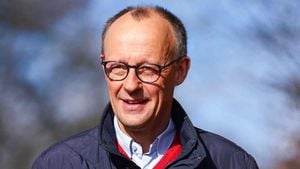Pope Francis, the 88-year-old pontiff, remains hospitalized at Rome's Gemelli Hospital as he battles double pneumonia, now confirmed as "critical" according to recent updates from the Vatican. His hospitalization, which began on February 14, follows severe respiratory difficulties linked to his long-standing health issues, including having part of one lung removed at the age of 21. The current medical situation presents significant challenges for his ability to fulfill the demanding role of the pope amid increasing concerns about his health and potential succession.
The Vatican reported on February 23, 2024, the night before had been relatively "tranquil," during which the pope seemed to rest comfortably after receiving supplemental oxygen and necessary blood transfusions. Vatican spokesperson Matteo Bruni noted, "The condition of the Holy Father continues to be 'critical', but he is alert and resting."
While the hospital has become familiar terrain for Francis—this marks his fourth stay there—his current condition has intensified fears among Catholics about the future of his papacy.
During his lengthy hospital stay, Pope Francis has used the opportunity to express his confidence in his treatment through messages formulated instead of the traditional Angelus prayer, typically delivered from the hospital—the absence of which speaks volumes about his health struggles.
"I am confidently continuing my hospitalization at the Gemelli Hospital, carrying on with the necessary treatment..." he stated, as he thanked health workers and offered appreciation for the flood of messages and prayers sent from across the globe. "He appreciates the closeness he feels at this time and asks, with a grateful heart, they continue to pray for him," the Vatican echoed, reinforcing the collective sentiment of compassion surrounding his health crisis.
Onlookers and faithful alike have gathered outside the hospital, contributing to supportive displays of prayer and affection. A senior prelate even stepped up to lead the Sunday Mass at St. Peter's Basilica, lending prayers to the pontiff and emphasizing the bond the faithful feel with their leader, articulately capturing the communal spirit: "...even though he is in a hospital bed, we feel Pope Francis close to us...," said Archbishop Rino Fisichella.
With his health deteriorated, the whispers of papal succession have grown louder, as speculation rises concerning potential successors. Among the names discussed are Cardinal Pietro Parolin, currently the Vatican's Secretary of State; Cardinal Fridolin Ambongo Besungu, prominent from the Democratic Republic of Congo; and Cardinal Matteo Zuppi, seen as strongly aligned with Francis's vision. Notably, Cardinal Parolin downplayed such rumors by emphasizing the pressing matter at hand: the pope's recovery.
The Vatican has been transparent about Pope Francis' health, issuing daily updates which have at times suggested complications from his condition. While tests have revealed low platelet counts associated with anemia—prompting blood transfusions—there are now serious talks about how illness could impact papal leadership moving forward. Dr. Andrea Vinci asserted, "It seems it is under control, but his body is indicating signs of trouble to overcome the situation." With age and pre-existing lung conditions contributing to his fragility, every shift could be detrimental.
Francis's health scares aren't entirely new, having previously undergone colon surgery and been hospitalized for bronchitis last year. Concerns for the pope’s health resonate not only with church officials but with millions of Catholics worldwide who are fervently praying for his recovery. The pope himself addressed these communities, acknowledging their letters and prayers, particularly those from children which have touched him deeply.
Despite relieving tensions through messages and maintaining strong public support, the looming uncertainty concerning his capacity to lead remains palpable. Should the pontiff’s situation worsen, it could trigger the Vatican’s procedures meant for such transitions, including the ritual of "sede vacante"—the period of mourning following the death of the pope and the resultant conclave tasked with selecting his successor.
According to the Vatican, the announcement of the pope's death initiates complex rituals honoring the office and simulating the mechanisms of governance during the "sede vacante" period, which has been carefully honed over centuries. Nevertheless, it is Cardinal Parolin's reassurance which stands firm against such tactics, insisting, "For now, our primary focus must be on the pope's health, recovery, and return to the Vatican."
With the horizon of change casting potential shadows on the leadership of the Catholic Church, speculations continue to stir amid prayers and human compassion rallying for the well-being of Pope Francis.



